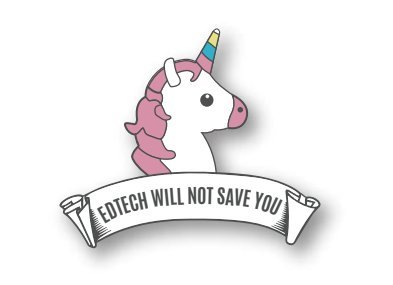If you went to this years ALT conference, you may have noticed the “EdTech will not save you” badges worn by delegates. Unsurprisingly, given the audience of ALT, they were met with some criticism (ironic). This post relates to the thin line we tread between critique and negativity.
‘tech wont save us’ brings unwarranted negative connotation. Be critical, not extreme.
I won’t say who said this but I bet you can guess what industry they work in.
Where’s the line?
I’ve written about this rather tedious attitude in The Criticism of Criticism blog post. This reductive idea that criticism, if you don’t agree with it, is negativity and should, therefore, be dismissed. Technology it seems, is beyond reproach. If you can’t say anything nice, don’t say anything at all. I think describing the badges as extreme is ridiculous because it’s actually true. EdTech will not save us.
So what’s the point?
This is purely my interpretation, you would have to ask Lawrie Phipps and Donna Lanclos to explain the ideas behind the badges for accuracy, but it relates to the positioning of edtech. Edtech has, for many years, been positioned (by us and vendors alike) as a solution to teaching and learning ‘problems’. As a quick and easy means of improvement. Teaching and learning is not a problem to be solved and THAT IS THE POINT OF THE BADGE.
Vendors are their own worst enemies
Vendors of EdTech products like to posit their wares as solutions to problems you didn’t even know you had. They like to appropriate pedagogical language and, to some extent, have been surreptitiously driving the development of digital pedagogy. For some reason, we’re not worried about that. Similar to handing over our data to a faceless company for the affordances of their technology, we continue to feed this industry despite the damage we may do ourselves and our discipline. They like to speak to senior management, the people with the £, and espouse how their tool will revolutionise the institution. They peddle their snake oil with outlandish promises that their technology will save us. It won’t, and THAT IS THE POINT OF THE BADGE.
Digital placebos
Very much linked to the above, some senior management see technology as a solution to problems (even without the influence of vendors) that are long, hard and messy to improve. Instead of investing in organisational development, instead of fighting those long and hard battles and rather than tackle a culture, technology can be seen as a quick fix. Problems with assessment? Slap a bit of tech on it. Problems with student retention? Slap a bit of tech on it. All this does is mask a problem. All it is is a placebo. It makes people feel better whilst nothing is actually happening to the root cause. Of course this is a generalisation and technology can bring genuine improvements, but that’s not always where or how it’s used. We walk around ALT C patting ourselves on the back and reveling in our ‘achievements’. Only a few ask the really important questions about whether what we are doing is good or right or ethical. A placebo may make us feel better but it’s not solving anything, and THAT IS THE POINT OF THE BADGE.
Calls to action
Sometimes you have to be blunt. Sometimes, a point is better made simply. Sometimes, caveats and context get in the way of the point. If the badge said “EdTech is useful and a positive benefit in many situations but we should make sure we are critical of it and the motivations behind it” it wouldn’t have had the same impact. Also, it would be a massive badge. Provocative statements make you think, and THAT IS THE POINT OF THE BADGE
There are negatives
There are lots of negatives around technology. if you can’t acknowledge them, then you’re fooling yourself. Negativity is warranted, and THAT IS THE POINT OF THE BADGE.
I will wear mine with pride.
*Image credit Lawrie Phipps, 2018





Leave a comment